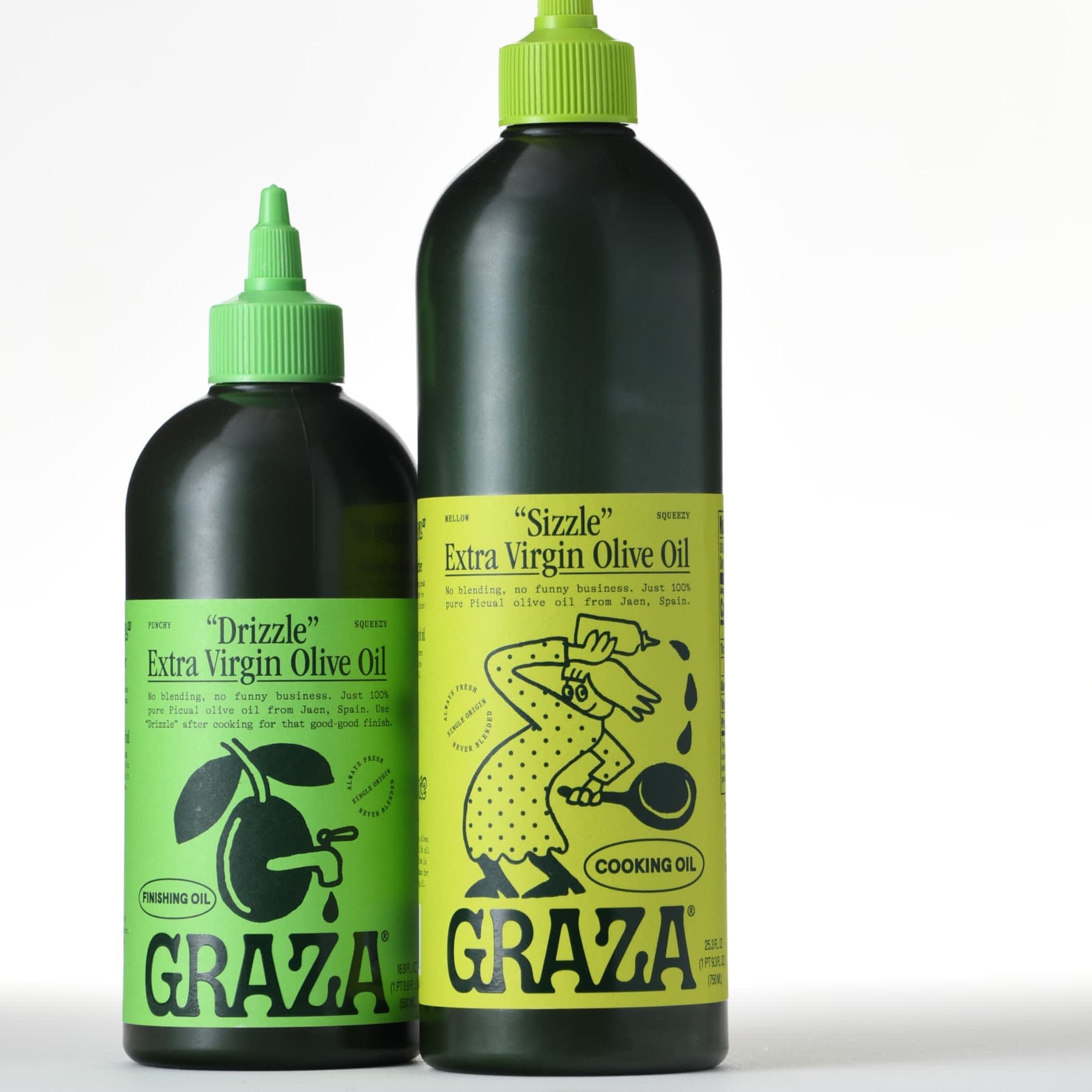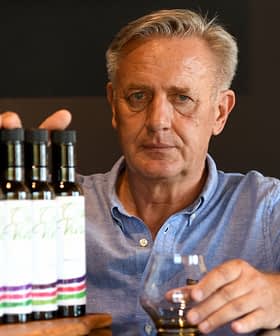 6K reads
6K readsProducer Profiles
Maybe to make it big as an upstart in the olive oil business these days, one would need millions in funding, a six-figure contract with an edgy branding agency, groundbreaking packaging with hipster graphics, and to be a darling of the media.
In just eighteen months, the founders behind the Brooklyn-based olive oil brand Graza have all that and more, working their green squeeze bottles to a store near you and 3,000 other U.S. retail points to compliment their thriving subscription service.
Like so many other stories new olive oil importers tell, there was the epiphany: “And you’re in the small villages in Spain, and even before I got to Jaén, and I’m trying recently pressed unfiltered co-op oil where people are coming and walking with five-liter jugs,” Graza co-founder Andrew Benin said of his drive through Andalusia three years ago. “And, you know, I’m in the middle of it and I’m thinking, man, I could sell this stuff. It’s amazing.”
Benin was living in Cádiz with his in-laws when he said he was inspired to “purvey the most amazing oils.” He brought a selection of his finds to his friend, Michael Anthony, the executive chef of Gramercy Tavern in New York. Anthony suggested Benin avoid the high end of the market.
“[Anthony] was like, ‘well, we definitely don’t need another one of those people in the world. There are plenty of them, there are plenty of them in this zip code. We don’t need another person slinging truffles and oil and jamón, and we need good olive oil for everyone.’”
Benin decided to go with a Picual monovarietal. “It doesn’t hold back when it comes to flavor and shamelessly slaps you in the face each time you eat it,” he said, eschewing the conventional descriptors a trained taster might use. “In Picual there’s something we just wanted to be involved in. And the story is simple, or one varietal, every bottle is oil from one farm. So we work with a variety of them, but we don’t mix them all together.”
(Listen to the full interview here)
It was also sensible for a brand with big ideas to go with the most ubiquitous olive cultivar on earth in terms of supply, pricing and scalability. “What Graza is doing is selling what we think is a superior quality olive oil at a palatable premium is how we like to call it,” Benin explained. “I didn’t wanna sell one bottle of olive oil and then leave it up to fate. You know, I wanted to make a system that people can consume and continue to purchase this quality of olive oil and use it so habitually that it becomes a fixture in their lives.”
It’s unclear who had the idea to use squeeze bottles, but Benin said he presented a photoshopped mockup of a Dr. Bronner’s bottle with a sriracha cap to his branding consultants, Gander. They came up with a deep green, matte-finish bottle, paper label and bold graphics that stand out in the olive oil aisle. Benin said the company invested in a custom mold, and that his Spanish bottle manufacturer likes to call him with the names of other companies who want access to the design.

“We do get phone calls from our suppliers whose molds we own for our bottles, saying, ‘Hey, there’s this Italian American company that is trying to buy your mold. We are not selling it to them, but hint, hint, this is who it is.’ And that’s what happens when you are buying millions of bottles and not thousands. Your supply chain supports you also.”
While having the mold locked down might provide some comfort, Benin said he lost his cool last April when another trendy upstart, Brightland, debuted a “pizza oil” in a (comparatively plain, low-budget) squeeze bottle. “While friendly competition was always welcome, I do view this as a blatant disrespect and am choosing to voice my discontent,” he wrote on LinkedIn, “…I think it’s ok to get miffed when folks rip you off.”
The angry post went viral, even making the pages of major publications, including the New York Times, where it was noted, “Graza did not respond to requests for comment.” (When asked why an upstart founder would ignore an email from the New York Times, Benin explained, “I was taking calls at three, four, or five in the morning with our PR team begging me to stop. It was the right advice.”)
When reminded that the hype surrounding his one-sided spat with Brightland amounted to more free publicity, Benin admitted, “we definitely have been a media darling, and we do a good job of innovating and pushing the limits to keep things fresh.”
The Graza labels provide the harvest dates and cheeky yet educational serving suggestions. The “Drizzle” oil is billed as an early (December) harvest best for dressing dishes, while the “Sizzle” is from late-harvested fruit and better for cooking. The labels explain the different yields obtained at the two harvest times: “24 lbs of olives = 1 liter of oil” for the late harvest and “13 lbs of olives = 1 liter of oil” for the early harvest, thereby explaining the bottle size and pricing.

Drizzle sells for $20 / 500ml, while the Sizzle is $15 for 750ml. The pricing places the brand in the middle range – higher than the old-guard mainstays and lower than most of the extra virgin oils crafted by smaller producers. “If I’m paying 36, 37 bucks for a bottle of olive oil, it better knock every article of clothing off my body, honestly,” Benin said. “If I’m paying that much for 375 ml, that should be a coming-to-God moment.”
Graza has momentum rarely seen in a notoriously crowded and challenging marketplace. The brand sports eye-catching packaging that social media can’t resist, one of the best custom Shopify builds around, explosive DTC and wholesale growth, and a reliable supply chain.
There are gnawing feelings among olive oil cognoscenti that plastic is problematic for olive oil storage and a late harvest Picual stands little chance of staying extra virgin for long, if it ever was. Yet Graza is reaching a lot of people with energetic messages while showing how cool you can be for squirting olive oil on your food.
Other brands are already coming out with look-alikes but without the polished execution behind Graza’s presentation. Benin believes he has assembled a team and culture that transcend the viral moments surrounding the brand’s launch.
“If other people are working on squeeze bottles,” Benin said, “then you know, someone should be thinking about what Graza is gonna do next, not what Graza has already done.”
.









